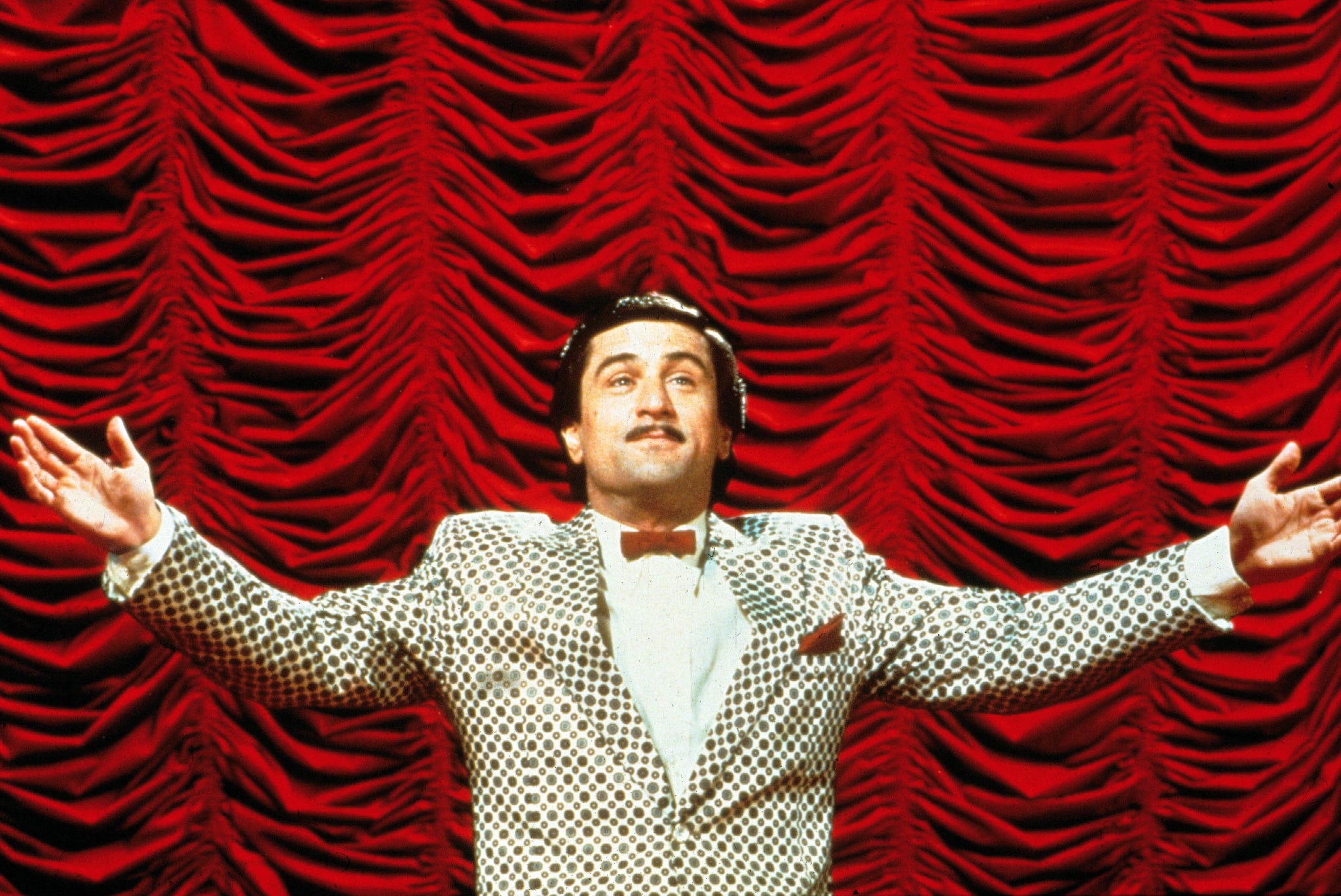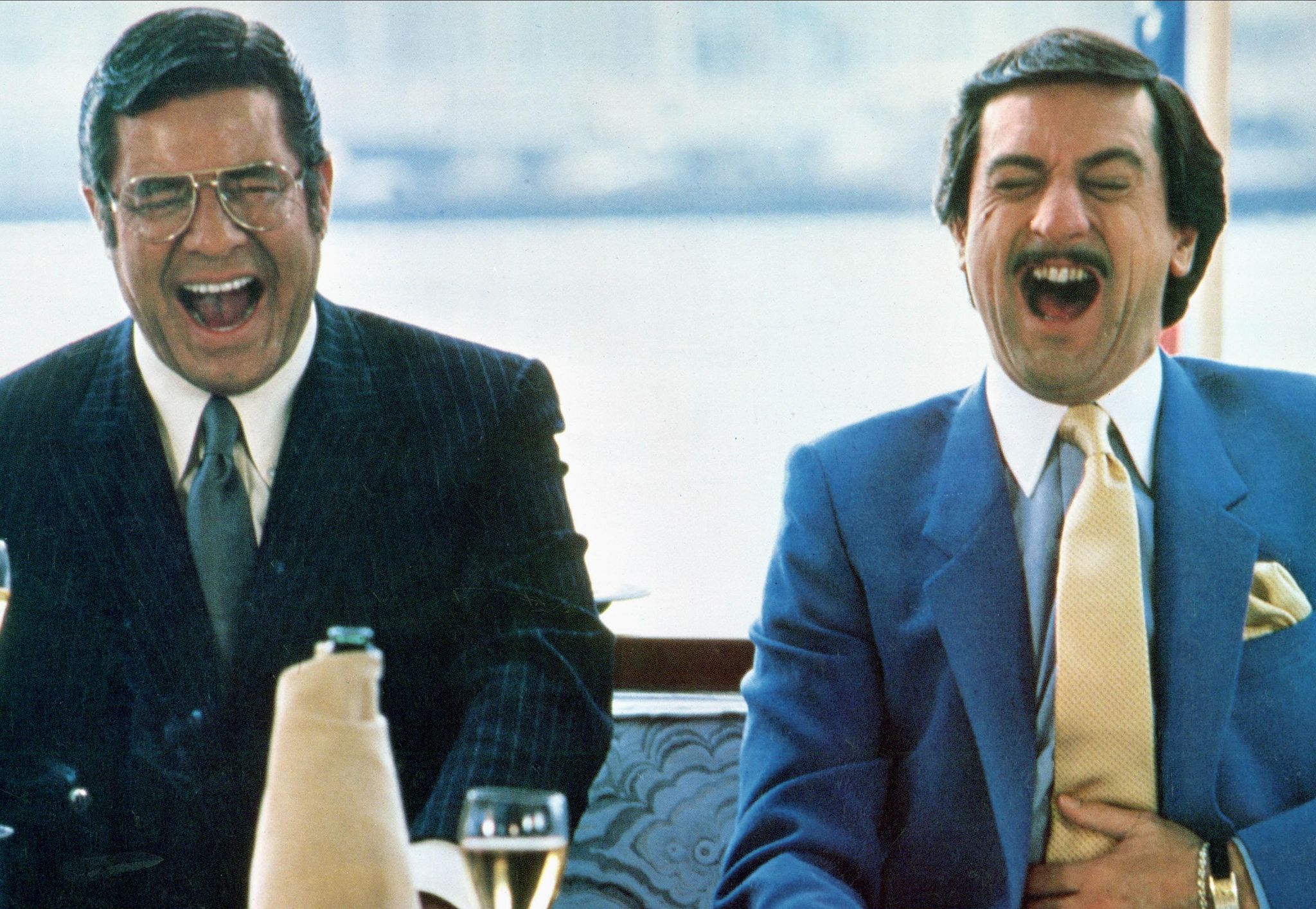The King of Comedy could have been the end of Martin Scorsese. The film opened on 18 February 1983; about a month later, Universal pulled it from cinemas. It made back $2 million of its $19 million budget. The director then crawled off to make the cheapest film he possibly could, and prove himself worthy of studio cash all over again.
Now that Scorsese has been cinema’s dad for a good couple of decades – the Oscar win for The Departed was the Hollywood equivalent of getting your own pop a spot on a track day at Silverstone – it’s easy to forget the fact that he thought he was finished by 1981. The King of Comedy was his third failure in a row. New York, New York hadn’t clicked, then Raging Bull charmed reviewers but not audiences.
“He was afraid he would always be the critics’ darling but the American public would never love him,” his friend and collaborator Sandy Weintraub said later.
But we’re now 40 years on, and The King of Comedy has shifted from being a fondly regarded outlier, to a minor masterpiece, to a cornerstone of Scorsese’s greatness. Since Joker leaned on its story to borrow a bit of gravitas, it’s been the connoisseur’s choice of favourite Scorsese film too. (Goodfellas is a bit gauche, and Taxi Driver implies you own a black leather trenchcoat.) And after four decades, its treatment of fame and fantasy is even more relevant than it was in 1983.
Back in 1981, Scorsese had poured himself into Raging Bull but was left devastated when it wobbled at the box office and an Oscar nomination for Best Director didn’t turn into a statuette. Robert De Niro won Best Actor for his turn as Jake LaMotta though, and he pressed Scorsese to direct a film about celebrity stalkers he’d picked up the option for. De Niro would play the delusional stand-up Rupert Pupkin, who imagined himself into his comedy hero Jerry Langford’s life.
Scorsese was in rough shape, recovering from pneumonia and undertaking a punishing schedule of therapy which had him in analysis five days a week and talking to his doctor over the phone at weekends. On set Scorsese kept reshooting and reshooting, at one stage taking two weeks to get a single scene right.
When he was done, he couldn’t face wandering through the near-million feet of film he’d accrued. He’d pop down from the editing room, find out someone from the studio had called about something, and find himself unable to do anything from the rest of the day.
All that anxiety is there on the screen. Fame had made De Niro anxious, too – especially after the attempted assassination of Ronald Reagan in 1981 – and the film is at its most far-sighted when it looks at fame and the famous.
Pupkin meets Langford – played by comedy legend Jerry Lewis – when he helps him out of a scrum outside a taping of his late night show, and it soon becomes clear that a simple thank-you won't do for Pupkin as a reward. He wants a slot on Langford's show, the break which could put him on the map. Langford tries to let him down gently, and Pupkin embellishes his chance encounter into a friendship to his fellow superfan Masha (Sandra Bernhard).
She's obsessed too – desperately trying to get money to him for reasons unknown, and frenzied with lust – and as Pupkin's attempts to get on Langford's show are ignored, he enlists her to kidnap him and force the network to give him the chance he feels he's earned.
It all functions like funhouse mirror reflection of the 1976 movie Network; where Sidney Lumet’s coldly satirical story has a mad-as-hell newsman finding fame almost against his will, Scorsese’s solicitous fantasist pins it down and forces himself upon it.
Howard Beale sermonises against the age of TV like a prophet. He absolutely bollocks you – you absolute idiot, you moron – for watching TV. But Rupert Pupkin is a televangelist.
Pupkin makes his demo reels for Langford, complete with canned laughter, and poses in front of a blown-up image of an adoring crowd. It’s impossible to say what’s real and what isn’t. He makes a world which comforts him and supports his neuroses.
And it’s that which means he’s still so relevant. There’s nothing high-handed about The King of Comedy. Pupkin’s attempts to get on stage are pathetic and fame is frightening, yes – in the opening sequence Langford is nearly ripped apart by fans outside his stage door – but look at Langford’s gilded life and tell me being famous isn’t worth it.
We’re now very used to the illusion that fame and the famous are closer to us than ever before. You can see what they’re up to and where they are whenever you like via social media, and even put words in their mouths should you fancy stumping up £125 to Mick Foley on Cameo.
We can watch and we can direct, but we’re performers now too. In some small way, we’re standing in front of Pupkin’s static image of the adoring crowd every time we dump the Christmas holiday pics or pencil-dive into the discourse with some opinions. Fame, or something like it, is a tweet or TikTok video away – and even if you don't want that, you can ride on other people's kind-of-fame to get a little piece of your own. Dunking on people you reckon deserve it feels like a public service, though quite where that turns into a potentially life-ruining pile-on is unclear.
Plus, the way that Pupkin’s confession to having kidnapped Langford is met with laughter prefigures the slippery relationship between irony and evil on the internet. He looks and sounds like a clown, and does a passable impression of a comedian. His terrible deed, slipped in among his gags, goes unnoticed.
Pupkin reckoned it was better to be a king for a night than schmuck for a lifetime. It’s never entirely clear whether Pupkin becomes either of those things, or whether he’s both. Does he win? Is it worth it? Ultimately, it’s less important than the reality he chooses – and that’s what gives The King of Comedy all its discomfiting power still.














